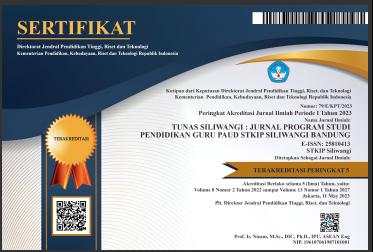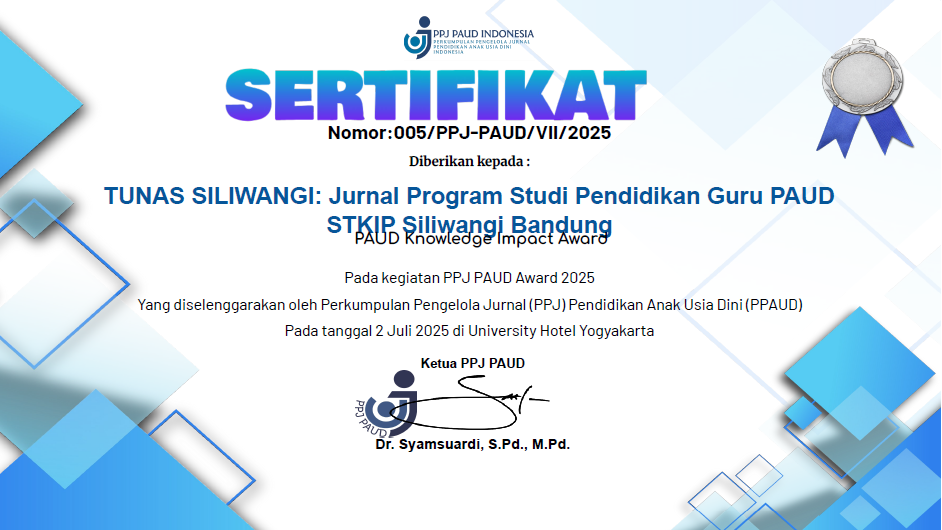Merdeka curriculum: use of information and communication technology media in early childhood education
DOI:
https://doi.org/10.22460/ts.v10i1.4643Keywords:
Merdeka Curriculum, Technology Information and Communication of Media, Early Childhood EducationAbstract
This research aims to determine the use of ICT media in the independent curriculum in early childhood education. To find out this goal, a qualitative descriptive research method was used on the action plans of three professional teacher education students involving an independent curriculum and information and communication technology media based on the observation process and analyzed using grounded theory analysis. Based on the results of the research analysis, the results obtained show that an independent curriculum involves information and communication technology as a learning medium. This is based on the use of ICT in online learning. However, its use is not given directly to children but is regulated by the teacher in planning, implementing, and assessing learning, giving rise to a new approach that can be applied to early childhood education, namely the TPACK learning approach. The TPACK learning approach is a learning approach that involves teacher competence, technology, and learning materials.
References
Amada, N. Z., & Hakim, A. (2022). Analisis penggunaan youtube sebagai media ajar pendidikan anak usia dini di era digital. Jurnal Riset Pendidikan Guru Paud, 2(1), 9–14. https://doi.org/10.29313/jrpgp.vi.612
Anggraini, D. L., Yulianti, M., Nurfaizah, S., & Pandiangan, A. P. B. (2022). Peran guru dalam mengembangan kurikulum merdeka. Jurnal Ilmu Pendidikan Dan Sosial, 1(3), Article 3. https://doi.org/10.58540/jipsi.v1i3.53
Battelle for Kids. (2019). Framework for 21st Century Learning. Battelle for Kids (BFK). https://static.battelleforkids.org/documents/p21/p21_framework_brief.pdf
Blackwell, C. K., Lauricella, A. R., & Wartella, E. (2014). Factors influencing digital technology use in early childhood education. Computers & Education, 77, 82–90. https://doi.org/10.1016/j.compedu.2014.04.013
Blackwell, C. K., Lauricella, A. R., & Wartella, E. (2016). The influence of TPACK contextual factors on early childhood educators’ tablet computer use. Computers & Education, 98, 57–69. https://doi.org/10.1016/j.compedu.2016.02.010
Charmaz, K. (2012). Constructing grounded theory: A practical guide through qualitative analysis (Repr). Sage.
Chtouki, Y., Harroud, H., Khalidi, M., & Bennani, S. (2012). The impact of YouTube videos on the student’s learning. 2012 International Conference on Information Technology Based Higher Education and Training (ITHET), 1–4. https://doi.org/10.1109/ITHET.2012.6246045
Direktorat PAUD, Dikdas dan Dikmen, Direktorat PAUD, Dikdas dan Dikmen. (2021). Buku saku tanya jawab kurikulum merdeka (pp. 9–46) [Monograph]. Sekretariat Jenderal, Kementerian Pendidikan, Kebudayaan, Riset dan Teknologi. https://repositori.kemdikbud.go.id/24917/
Edwards, S. (2013). Digital play in the early years: A contextual response to the problem of integrating technologies and play-based pedagogies in the early childhood curriculum. European Early Childhood Education Research Journal, 21(2), 199–212. https://doi.org/10.1080/1350293X.2013.789190
Fitria, A. (2014). Penggunaan media audio visual dalam pembelajaran anak usia dini. Cakrawala Dini: Jurnal Pendidikan Anak Usia Dini, 5(2), Article 2. https://doi.org/10.17509/cd.v5i2.10498
Herlina, H., & Indrati, Y. (2010). SEJARAH PERKEMBANGAN KURIKULUM TAMAN KANAK-KANAK DI INDONESIA DARI MASA KE MASA. PUSAT KURIKULUM BADAN PENELITIAN DAN PENGEMBANGAN KEMENTERIAN PENDIDIKAN NASIONAL. https://staff.universitaspahlawan.ac.id/web/upload/materials/3611-materials.pdf
Jannah, M. M., & Harun, H. (2023). Kurikulum Merdeka: Persepsi Guru Pendidikan Anak Usia Dini. Jurnal Obsesi : Jurnal Pendidikan Anak Usia Dini, 7(1), Article 1. https://doi.org/10.31004/obsesi.v7i1.3800
Kurikulum Merdeka dengan Berbagai Keunggulan. (n.d.). Retrieved January 16, 2024, from https://pskp.kemdikbud.go.id/berita/detail/313037/kurikulum-merdeka-dengan-berbagai-keunggulan
Lambert, V. A., & Lambert, C. E. (2012). Qualitative Descriptive Research: An Acceptable Design. Pacific Rim International Journal of Nursing Research, 16(4), Article 4.
Lehmann, H. (2010). Research method: Grounded theory for descriptive and exploratory case studies. In H. Lehmann (Ed.), The Dynamics of International Information Systems: Anatomy of a Grounded Theory Investigation (pp. 53–65). Springer US. https://doi.org/10.1007/978-1-4419-5750-4_5
Lestari, R. H., Westhisi, S. M., & Wulansuci, G. (2023). Media Berbasis TIK Sebagai Media Pengganti Realitas Pada Pembelajaran Anak Usia Dini Di Masa Pandemi Covid-19. Jurnal Ilmiah Potensia, 8(1), Article 1. https://doi.org/10.33369/jip.8.1.26-34
Lindawati, Y. I., & Rahman, C. A. (2020). Adaptasi guru dalam implementasi pembelajaran daring di era pandemi covid-19. Prosiding Seminar Nasional Pendidikan FKIP, 3(1), Article 1.
Lozano-Blasco, R., Quilez-Robres, A., Delgado-Bujedo, D., & Latorre-Martínez, M. P. (2021). YouTube’s growth in use among children 0–5 during COVID19: The Occidental European case. Technology in Society, 66, 101648. https://doi.org/10.1016/j.techsoc.2021.101648
Maharani, C., & Zulminiati, Z. (2021). Implementasi metode steam di taman kanak-kanak. Jurnal Family Education, 1(3), Article 3. https://doi.org/10.24036/jfe.v1i3.12
Motimona, P. D., & Maryatun, I. B. (2023). Implementasi metode pembelajaran STEAM pada kurikulum merdeka untuk PAUD. Jurnal Obsesi : Jurnal Pendidikan Anak Usia Dini, 7(6), Article 6. https://doi.org/10.31004/obsesi.v7i6.4682
Munajim, A., Barnawi, B., & Fikriyah, F. (2020). Pengembangan Kurikulum Pembelajaran di Masa Darurat. DWIJA CENDEKIA: Jurnal Riset Pedagogik, 4(2), Article 2. https://doi.org/10.20961/jdc.v4i2.45288
National Assosiation Education for Young Children (NAEYC). (2012). Technology and Interactive Media as Tools in Early Childhood Programs Serving Children from Birth through Age 8. https://www.naeyc.org/sites/default/files/globally-shared/downloads/PDFs/resources/position-statements/ps_technology.pdf
Neumann, M. M., & Herodotou, C. (2020). Young Children and YouTube: A global phenomenon. Childhood Education, 96(4), 72–77. https://doi.org/10.1080/00094056.2020.1796459
Nugraha, T. S. (2022). Kurikulum Merdeka untuk pemulihan krisis pembelajaran. Inovasi Kurikulum, 19(2), Article 2. https://doi.org/10.17509/jik.v19i2.45301
Nuridayanti, N., Muryaningsih, S., Badriyah, B., Solissa, E. M., & Mere, K. (2023). Peran teknologi pendidikan dalam implementasi kurikulum merdeka. Journal on Teacher Education, 5(1), Article 1. https://doi.org/10.31004/jote.v5i1.16957
Peraturan Menteri Pendidikan Dan Kebudayaan Republik Indonesia Nomor 137 Tahun 2014 Tentang Standar Nasional PAUD (Menggantikan Peraturan Menteri Pendidikan Dan Kebudayaan Nomor 58 Tahun 2009, Pub. L. No. 137, 137 Permendibud 1 (2014). https://repositori.kemdikbud.go.id/12860/
Pusat Kurikulum dan Pembelajaran. (n.d.). Kurikulum Darurat. Sistem Informasi Kurikulum Nasional. Retrieved January 16, 2024, from http://kurikulum.kemdikbud.go.id/kurikulum-darurat
Retnaningsih, L. E., & Khairiyah, U. (2022). Kurikulum Merdeka pada Pendidikan Anak Usia Dini. SELING: Jurnal Program Studi PGRA, 8(2), 143–158. https://doi.org/10.29062/seling.v8i2.1223
Rosenberg, J. M., & Koehler, M. J. (2015). Context and technological pedagogical content knowledge (tpack): A systematic review. Journal of Research on Technology in Education, 47(3), 186–210. https://doi.org/10.1080/15391523.2015.1052663
Sakti, R., & Eliza, D. (2022). Faktor-faktor yang mempengaruhi kesiapan guru untuk pembelajaran online di PAUD: Technological pedagogical and content knowledge (TPACK). PELANGI: Jurnal Pemikiran Dan Penelitian Islam Anak Usia Dini, 4(2), Article 2. https://doi.org/10.52266/pelangi.v4i2.912
Sanjaya, J. B., & Rastini, R. (2020). Implementasi Kurikulum Darurat di Masa Pandemi COVID-19 Dalam Upaya Pemenuhan Hak Pendidikan. JIL : Journal of Indonesian Law, 1(2), Article 2. https://doi.org/10.18326/jil.v1i2.161-174
Yundayani, A. (2019). Technological pedagogical and content knowledge: Konsep analisis kebutuhan dalam pengembangan pembelajaran. https://jurnal.stkipkusumanegara.ac.id/index.php/semnara2019/article/view/138
Yus, A. A., & Saragih, P. C. (2023). Pengaruh penggunaan media audiovisual terhadap kemampuan bahasa ekspresif anak usia dini. Jurnal Obsesi : Jurnal Pendidikan Anak Usia Dini, 7(2), Article 2. https://doi.org/10.31004/obsesi.v7i2.3186
Downloads
Published
Issue
Section
License
Copyright (c) 2025 Ririn Hunafa Lestari, Sharina Munggaraning Westhisi, Liza Bunga Aprilia

This work is licensed under a Creative Commons Attribution-ShareAlike 4.0 International License.
The author is responsible for acquiring the permission(s) to reproduce any copyrighted figures, tables, data, or text that are being used in the submitted paper. Authors should note that text quotations of more than 250 words from a published or copyrighted work will require grant of permission from the original publisher to reprint. The written permission letter(s) must be submitted together with the manuscript.






